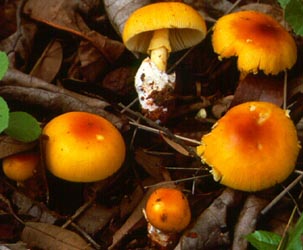|
[ Section Caesareae page. ]
[ Amanita Studies ]
[ Keys & Checklist/Picturebooks ] "Masasi Slender Caesar"
Technical description (t.b.d.) BRIEF DESCRIPTION: The cap of Amanita masasiensis is 30 - 70 mm wide, convex, becoming planar and (sometimes) with a depressed disc, lacking an umbo or with a low broad one, smooth, slightly sticky, nonappendiculate, with a striate margin (35 - 40% of the radius); it's cap is yellow to yellow-orange, more strongly pigmented and redder over disc, and yellow at the margin. The flesh is white, strongly yellow under cap skin, and sometimes somewhat yellow above the gills; it is soft to firm. The volva is occasionally present as white patches. The gills are free, fairly crowded, yellow, thin, with a smooth and concolorous edge. The stem is 60 - 70 x 9 - 11 mm, yellow, and cylindric. The flesh is white, brittle-fibrous, stuffed, and becoming hollow. The rather large, saccate volva is membranous, white, somewhat floccose on exterior surface,and attached at the extreme base of the stem. The spores of this species measure (8.5-) 8.6 - 10.8 (-12.1) × (5.5-) 6.0 - 7.0 (-9.0) µm and are ellipsoid to elongate and inamyloid. The original description describes spores as too broad because of an apparent typographical error. Clamps are common at bases of basidia. Amanita masasiensis was originally described from Tanzania. It is also known from Zambia. It occurs in miombo woodland with Brachystegia and Uapaca. It has also been found in a plantation of Arandarium. It can be assigned to Amanita stirps Hemibapha. Its cap pigmentation is similar to that of A. hemibapha (Berk. & Broome) Sacc. The latter has smaller spores, different associated woody plants, and is known from southern India and Sri Lanka. The present species is a market species in Africa. For other regional market species of sect. Caesareae, see A. mafingensis Härk. & Saarim.. -- R. E. Tulloss
[ Section Caesareae page. ]
[ Amanita Studies ]
[ Keys & Checklist/Picturebooks ] Last changed 9 October 2009. |
